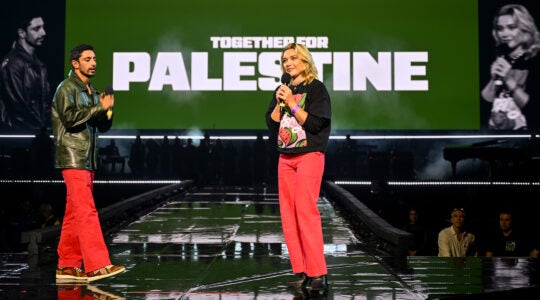 Amsterdam Mayor Job Cohen’s office is in a sun-drenched room overlooking the city’s main canal, the Amstel. On the table in the center sat four glasses emblazoned with the city’s logo, which also adorns the outside of the building, the ID pass I was issued, and a flag that flies from the building’s roof. The logo: three red "X"’s. Talk about unsubtle.
Amsterdam Mayor Job Cohen’s office is in a sun-drenched room overlooking the city’s main canal, the Amstel. On the table in the center sat four glasses emblazoned with the city’s logo, which also adorns the outside of the building, the ID pass I was issued, and a flag that flies from the building’s roof. The logo: three red "X"’s. Talk about unsubtle.
Cohen is the fourth Jewish mayor of Amsterdam since the war, though his Wikipedia page identifies his religion as atheist. His paternal grandparents died in Bergen Belsen and Cohen told me there was much talk about the war when he was a child (he was born in 1947).
Cohen is thoroughly secular — asked about ways in which Judaism informs his sense of self, Cohen couldn’t come up with anything — but unlike some European Jews who preferred to suppress their identity after the war, Cohen says he always knew he was Jewish. With a name like that, it’s hard not to.
"Well, of course, there is not a direct relation between the fact that the terrible things which happened to the Jewish community in Amsterdam and the fact that now after this stuff, the war, we have had now four Jewish mayors," Cohen told me. "But it must be a little more than a coincidence."
I pointed out that that’s a better record than New York. "Well," he said with a smile, "New York is a descendant of Amsterdam."
If it weren’t for the murder on Nov. 2, 2004 of a filmmaker then little known outside the Netherlands, it’s possible most of the world would never have heard of Job Cohen. But Theo Van Gogh’s slaying by a Muslim extremist changed all that. Already controversial for his role in the film "Submission," which explored the role of women in Islam, Van Gogh was shot in broad daylight as he pedaled to work along an Amsterdam street. As he lay dying, his throat was slit and a note threatening Western governments and Jews was pinned to his body.
The murder sent shock waves through a city renowned for its tolerance. In its aftermath, Cohen was widely credited with keeping the peace in Amsterdam. Time magazine named Cohen one of its 2005 European heroes for his "inclusive" policies.
Five years later, Cohen says the tensions have been reduced, but they are still simmering. And he pointed a finger, in part, at Geert Wilders for inflaming public passions.
"It’s the voice of fear against the voice of dialogue," Cohen said. "We have both streaks in our society at this moment."
Cohen registered two main complaints against Wilders. One was stylistic; Wilders is known to be deliberately provocative, and even after just 20 minutes with Cohen it’s clear his political style is reserved and soft-spoken, which is perhaps why his critics see him as insufficiently resolute on the Muslim issue.
The other was substantive: Wilders, Cohen said, lumps all Muslims together. In fact, Wilders often says that Islam, not Muslims, are the problem. Cohen called that rhetorical device a "trick."
"People have fear, and I can understand that, especially a fear for this extreme part of Islam. There are reasons for that, because well, we had here, in Amsterdam, this murder of Theo Van Gogh by a Muslim extremist. But having this Muslim extremist doesn’t, in my view, mean that all Muslims are extremists. Not at all."
This argument — whether the issue is Islam itself or merely the minority of Muslims who can be called extremist — has been raging since Sept. 11. Or at least that’s when most of us started paying attention to it. But in the U.S., while we still worry about domestic terrorism, we don’t have the fear of social unrest that is in evidence in Amsterdam, particularly among the city’s Jews.
Cohen told me it was "terrible" that some Jews feel uncomfortable going with a kippah, and he noted that there are "too many incidents in which people are attacked" for wearing one. But he was doubtful that, even given Jewish anxieties, many of them would find in Wilders an acceptable solution.
"I know some of those people really will say they have, at least to some extent, are in favor of Wilders," Cohen said. "But I don’t believe that many of them will go that direction. I don’t believe that, but I’m not sure of course."
JTA has documented Jewish history in real-time for over a century. Keep our journalism strong by joining us in supporting independent, award-winning reporting.





